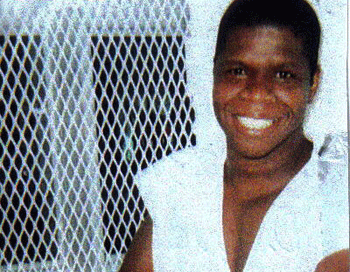
Duane Buck was sentenced to death in Texas after his own lawyer called an “expert” who testified that Buck was more likely to be dangerous in the future because he is black. At this crucial moment, when our nation is addressing racial bias in the criminal justice system, the U.S. Supreme Court is expected to decide whether to hear the full case in the next few weeks. The Court should do everything in its power to ensure Buck receives a full and fair review of his case and, ultimately, a new sentencing hearing, free of racial bias.
In 1997, when Buck went on trial for capital murder of his ex-girlfriend, Debra Gardner, and her friend, Kenneth Butler, racial disparity was commonplace in the justice system – especially in Houston, Texas. One study found that the Harris County DA’s office, which covers the city of Houston, sought the death penalty disproportionately against people of color in that time period. For Buck, it wasn’t merely systemic bias that tainted his case, but also his own lawyer’s actions.
In order to be sentenced to death in Texas, a jury must decide that a person is likely to be a “future danger” to society. Buck’s own lawyer called an “expert” witness who testified that Buck was more likely to be dangerous in the future because he is black. The prosecutor reiterated this inaccurate and offensive racial claim. By the time the jury began their deliberations, they had heard it four times without any objection from Buck’s lawyer, and they sentenced Buck to death.
In addition to this pivotal failure of Buck’s original lawyer, his lawyer on appeal also failed to challenge the original lawyer’s conduct.
In 2011, two U.S. Supreme Court justices agreed that Buck’s sentence required legal review because “our criminal justice system should not tolerate” a death sentence “marred by racial overtones.” In the end, the Court’s majority refused to rule on the case. A more recent decision by the U.S. Supreme Court, however, has allowed Buck to appeal to the high court again.
“It is incomprehensible that a lawyer defending an African-American man facing the death penalty would knowingly introduce ‘expert’ testimony linking race to dangerousness,” said Christina Swarns, Director of Litigation at the NAACP Legal Defense Fund. “And the American public cannot and will not have confidence in a court system that turns a blind eye to such explicit discrimination.”
In a recent op-ed in the conservative Daily Caller, EJUSA’s Marc Hyden points out that six other men who received death sentences under similar circumstances have already received resentencing hearings:
“In fact, after Buck’s trial, John Cornyn, who was Texas’ Attorney General at the time, admitted that the expert testimony was inappropriate. Cornyn found seven cases, including Buck’s, where such statements were presented, and he promised to address these instances. Six of those seven have since received new sentencing hearings, but Buck is the only person who hasn’t been granted an unbiased resentencing hearing.”
Check out the video below, highlighting the racial discrimination in the Texas death penalty system and calling for a new, fair sentencing hearing in Buck’s case. The video is narrated by former Texas Governor Mark White and includes a prosecutor from Buck’s original trial, a surviving victim of the crime, leading civil rights figures in the Texas, and others.
Watch this space for news of when the Supreme Court makes its decision whether to hear the case. We hope to eventually share the good news that Buck will get the new sentencing hearing that he was promised, free of racial bias.



